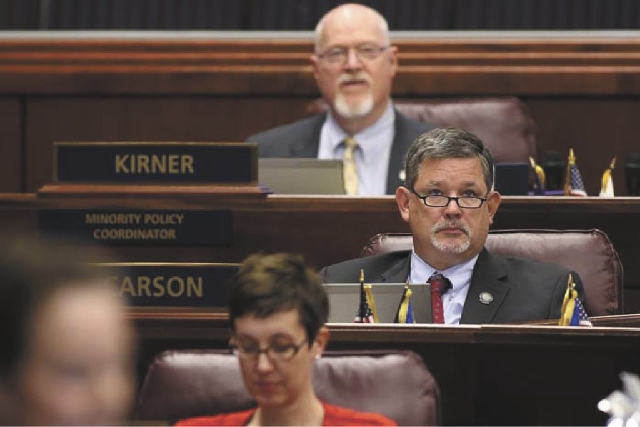GOP agenda stymied in Legislature

CARSON CITY — Republican lawmakers and their allies have been thwarted in pursuing their conservative agenda in the 2013 Legislature.
They have been blocked on issues from establishing a school voucher plan to reining in what they see as excesses in Nevada’s construction defects law.
Several issues, including changes to the workers’ compensation program and the state Public Employees’ Retirement System, have traditionally formed a core of objectives for many Republicans in each session. But the GOP minority status in both the Senate and Assembly has made change difficult if not impossible to achieve.
Conservatives don’t believe all is lost, however.
Endgame negotiations between the two parties could still produce results.
Senate Minority Leader Michael Roberson, R-Las Vegas, said he believes the construction defects issue will be part of any final agreement to end the 2013 session.
“Construction defect reform is alive and well,” he said. “I suspect it will be part of the endgame this session. I have emergency bills that I can use to bring it back. I expect it to be back on the table when we’re trying to close out the session.”
And a few measures did survive a Friday deadline for action on many bills.
Senate Bill 445, a school choice bill sought by Gov. Brian Sandoval, remains alive in the Senate Finance Committee. The bill would give businesses tax breaks for donating money to fund school choice scholarships that would allow more students to attend private and religious schools.
Assembly Bill 342, which would make changes to the state’s Public Employees’ Retirement System, is expected to get a hearing soon in the Assembly Ways and Means Committee.
It would change the traditional “defined benefit” pension program in place for Nevada public employees to a hybrid plan including a “defined contribution” component for future hires.
The bill sought by Assemblyman Randy Kirner, R-Reno, faces an uphill battle given Sandoval’s decision to support a review of the Public Employees’ Retirement System before seeking any wholesale changes. The study won’t be complete before the 2013 legislative session is over.
Assembly Bill 184, a construction defect measure sponsored by Assemblyman Wes Duncan, R-Las Vegas, also remains in play as the session moves into its final seven weeks.
Assembly Minority Leader Pat Hickey, R-Reno, said in his legislative update Monday that the GOP will continue to pursue changes to the state’s construction defect laws.
Using a football metaphor, he said: “However, look for an end-run by the elephant team before the clock runs out — with contractors finally getting the right to repair, and homeowners no longer victimized by the unscrupulous.”
Sen. Tick Segerblom, D-Las Vegas, said the never-ending efforts by conservative lawmakers and their supporters to change the laws on such issues are doomed.
Voters have given Democrats majorities in both houses, and there is no way these lawmakers will support detrimental changes to workers’ compensation benefits or homeowners’ rights to sue over defective construction, he said.
Democrats have offered to compromise on some issues, including proposing reforms to the construction defects law, but Republicans want “to go for the whole enchilada,” Segerblom said.
“That’s not going to happen,” he said.
Geoffrey Lawrence, deputy director of policy at the libertarian think tank Nevada Policy Research Institute, said supporters of such changes have to build a case among the electorate to get lawmakers to consider them seriously.
Lawrence said he will testify in support of the governor’s school choice bill, and the other measures still in play, to build a case on the public record for the reforms.
“If lawmakers vote against them afterwards, they can be held accountable for that,” he said.
Republicans might have more success if Sandoval would use his “bully pulpit” to push more strongly for change, Lawrence said.
Many conservative efforts fell by the wayside Friday. They were among the 138 Assembly and 126 Senate bills that won’t see further consideration this session.
Roberson’s Senate Bill 161, aimed at changing what he views as Nevada’s job-killing construction defect law, is dead for the session. The bill would have defined a constructional defect as a flaw that “presents an unreasonable risk of injury to a person or property.” It also sought to reduce the time allowed to file lawsuits and remove attorney’s fees from recoverable damages.
Some homeowners and trial lawyers opposed the changes, which were supported by the homebuilding industry.
Duncan’s bill remains a potential vehicle for changes to the construction defect laws. He said his bill mirrors a bipartisan measure passed by the state Senate in 2009. It tightens the definition of a defect, limits the time in which an action can be brought in court and eliminates the mandatory award of attorney’s fees to the winning side in a dispute.
Roberson’s Senate Bill 289, dealing with changes to the workers’ compensation system, also failed to make it out of committee.
Senate Joint Resolution 10, sought by Sen. Barbara Cegavske, R-Las Vegas, to change the state constitution to provide for vouchers for parents to send their children to private school, also failed to advance.
Efforts by Republican lawmakers to change Nevada’s prevailing wage law also ran into trouble, although Hickey said the issue may come up for review in the interim before the 2015 session.
Assembly Bill 318 by Assemblyman Cresent Hardy, R-Mesquite, proposed to lift the project threshold on public works projects in which the prevailing wage must be paid from $100,000 to
$1.5 million. The $100,000 threshold was set in 1985.
Prevailing wages, or the pay workers receive on public projects, are determined through a survey of labor pay in an area by the state labor commissioner. Often, however, the pay comes close to what unions pay, in part because most surveys are not returned.
The bill did not survive the Friday deadline.
Bills seeking changes to the state collective bargaining laws for local government workers failed too.
Contact Capital Bureau reporter Sean Whaley at swhaley@reviewjournal.com or 775-687-3900.












